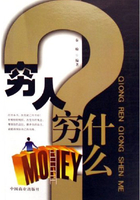1. Today I can complain because the weather is rainy or I can be thankful that the grass is getting watered for free.
for free:免费
2. ...my parents didn’t give me when I was growing up or I can feel grateful that they allowed me to be born.
grow up:成长;逐渐形成
我们为什么不快乐
Don’t Let Happiness Run away from Us
佚名 / Anonymous
A college student once told me: “I don’t need to be happy—just successful.”
It’s an odd juxtaposition. She needn’t be happy—“just successful”. She places one in opposition to the other.
Students are today’s expressions of tomorrow’s practices. Their words can be the visible signs of the less visible struggles encountered by us all.
I have a memory from my own undergraduate years of a headline in my campus newspaper: “Why Aren’t We Happy?” As the headline suggests, we fell short of leading joyful lives. Yet at least happiness was still on the agenda. What underlies the tendency of many of us, like my success-seeking student, to give up genuinely trying?
I’ve often failed to enjoy Sunday because of my schedule on Monday. At bottom, it was simply anticipatory anxiety over the work of the week ahead—fear that there would be unexpected complications or that I would fail to measure up in some way. Usually, when Monday came, I did quite well. Much of what I worried about never happened.
Joy has its own moral underpinning. There’s a completeness to joy that does not allow us to exclude our sense of the person we should be. Pleasure is certainly possible in less-than-honorable actions. But the experience of joy requires more; it is pleasure taken in worthy things.
True joy requires choices that develop into habits that evolve into character. And that’s work we can’t delegate.
The essential first step is trying to live a less fearful life—one that avoids collapsing life’s possibilities before exploring them. It entails welcoming uncertainty and comfortable incompleteness.
一个大学生曾告诉我:“我不需要快乐——我只要成功。”
她这么比较这两个概念很奇怪,她不需要快乐——“只要成功”,也就是说,她将这两者放在了对立面上。
学生今天的言,就是社会明天的行,他们所说的话是一种明显的信号,我们每个人都在努力奋斗,只是我们的态度往往不易觉察。
记得上大学时,校报上有一篇文章的标题是这样的:“为什么我们不快乐?”这个标题的意思是:我们的生活缺少快乐。然而,我们的生活中有快乐,至少,我们仍在寻找快乐。只是,像那个追求成功的学生一样,许多人宁愿放弃快乐,这是为什么呢?
想到星期一的工作日程,我经常连星期天都过不好。这实际上是提前对未来一周的工作感到焦虑——担心会发生意想不到的麻烦,或自己在某些方面做不好。我通常在正常上班的日子做得很不错,我担心的很多事从未发生过。
快乐自有其在心理上的基础架构,快乐的完整性让我们不得不考虑自己应该做什么样的人。当然,一些不怎么光彩的行为也会衍生快乐。但是,体验快乐需要的不仅仅是这些,我们需要体验有意义的快乐。
真正的快乐需要做出选择,这些选择可以养成习惯,从而形成性格,这是只有我们自己才能做到的。
最基本的第一步就是,我们要尝试去过一种没有过多忧虑的生活——这种生活可以避免我们患得患失,从而有勇气去探索快乐。这种生活难免会有各种不测,但是我们需要坦然面对生活的缺憾。
记忆填空
1. Students are_______expressions of tomorrow’s practices. Their words can be the visible _______ of the less visible struggles encountered by us all.
2. I’ve often_______ to enjoy Sunday because of my schedule on Monday. At bottom, it was simply anticipatory anxiety over the work of the week ahead—fear there would be unexpected complications or that I would fail to measure up in some _______. Usually, when _______ came, I did quite well. Much of what I worried about never _______.
佳句翻译
1. 但是,体验快乐需要的不仅仅是这些,我们需要体验有意义的快乐。
2. 真正的快乐需要作出选择,这些选择可以养成习惯,从而形成性格。
3. 这种生活难免会有各种不测,但是我们需要坦然面对生活的缺憾。
短语应用
1. She places one in opposition to the other.
in opposition to:反对;与……相反
2. Yet at least happiness was still on the agenda.
on the agenda:列入议程
生活的半对半理论
The 50-percent Theory of Life
佚名 / Anonymous
I believe in the 50-percent theory. Half the time things are better than normal; the other half, they are worse. I believe life is a pendulum swing. It takes time and experience to understand what normal is, and that gives me the perspective to deal with the surprises of the future.
Let’s benchmark the parameters: Yes, I will die. I’ve dealt with the deaths of both parents, a best friend, a beloved boss and cherished pets. Some of these deaths have been violent, before my eyes, or slow and agonizing. Bad stuff, and it belongs at the bottom of the scale.
Then there are those high points: romance and marriage to the right person; having a child and doing those Dad things like coaching my son’s baseball team, paddling around the creek in the boat while he’s swimming with the dogs, discovering his compassion so deep it manifests even in his kindness to snails, his imagination so vivid he builds a spaceship from a scattered pile of Legos.
But there is a vast meadow of life in the middle, where the bad and the good flip-flop acrobatically. This is what convinces me to believe in the 50-percent theory.
One spring I planted corn too early in a bottomland so flood-prone that neighbors laughed. I felt chagrined at the wasted effort. Summer turned brutal — the worst heat wave and drought in my lifetime. The air-conditioner died, the well went dry, the marriage ended, the job lost, the money gone. I was living lyrics from a country tune—music I loathed. Only a surging Kansas City Royals team, bound for their first World Series, buoyed my spirits.
Looking back on that horrible summer, I soon understood that all succeeding good things merely offset the bad. Worse than normal wouldn’t last long. I am owed and savor the halcyon times. They reinvigorate me for the next nasty surprise and offer assurance that I can thrive. The 50-percent theory even helps me see hope beyond my Royals’ recent slump, a field of struggling rookies sown so that some year soon we can reap an October harvest.















